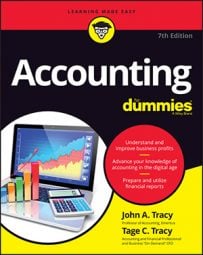Alternatively, you can invest in publicly traded securities, those stocks and bonds traded every day in major securities markets. Your stockbroker would be delighted to execute a buy order for 100 shares of, say, Caterpillar for you. Keep in mind that your money doesn’t go to Caterpillar; the company isn’t raising additional money. Your money goes to the seller of the 100 shares. You’re investing in the secondary capital market — the trading in stocks by buyers and sellers after the shares were originally issued some time ago.
In contrast, you can invest in the primary capital market, which means that your money goes directly to the business. These days, a growing tactic of raising money is crowdfunding, which is done over the Internet. On a website, a new or early-stage business invites anyone with money to join in the venture and become a stockholder. Usually, you can invest a relatively small amount of money in a crowdfunding appeal. The business seeking the money is counting on a large number of people to invest money in the venture.
You may choose not to manage your securities investments yourself. Instead, you can put your money in any of the thousands of mutual funds available today, or in an exchange-traded fund (ETF), or in closed-end investment companies, or in unit investment trusts, and so on. You’ll have to read lots of information to gain an understanding of the choices you have for investing your money and managing your investments.
Investors in a private business have just one main pipeline of financial information about the business they’ve put their hard-earned money in: its financial reports. Of course, investors should carefully read these reports. “Carefully,” means they should look for the vital signs of progress and problems. The financial statement ratios point the way — like signposts on the financial information highway.
Investors in securities of public businesses have many sources of information at their disposal. Of course, they can read the financial reports of the businesses they have invested in and those they’re thinking of investing in. Instead of thoroughly reading these financial reports, they may rely on stockbrokers, the financial press, and other sources of information.Many individual investors turn to their stockbrokers for investment advice. Brokerage firms put out all sorts of analyses and publications, and they participate in the placement of new stock and bond securities issued by public businesses. A broker will be glad to provide you with information from companies’ latest financial reports.
The more you know about interpreting a financial report, the better prepared you are to evaluate the commentary and advice of stock analysts and other investment experts. If you can at least nod intelligently while your stockbroker talks about a business’s P/E and EPS, you’ll look like a savvy investor — and you may get more favorable treatment. You may regularly watch financial news on television or listen to one of today’s popular radio financial talk shows.
Investors don’t rely solely on financial reports when making investment decisions. Analyzing a business’s financial reports is just one part of the process. You should consider these additional factors, depending on the business you’re thinking about investing in:
- Industry trends and problems
- National economic and political developments
- Threatened action by regulatory agencies against the business
- Possible mergers, friendly acquisitions, and hostile takeovers
- Turnover of key executives
- Labor problems
- International markets and currency exchange ratios
- Supply shortages
- Product surpluses

